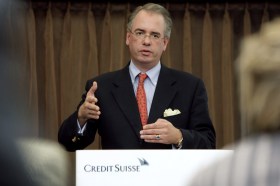CRIMINAL CAPITALI$M
Credit Suisse chief faces early test in $800m Singapore trial
Ulrich Körner has his hands full as he steers Credit Suisse through troubled waters.
Keystone / Salvatore Di Nolfi
Ulrich Körner faces his first test as Credit Suisse chief executive as the bank goes on trial in Singapore over its past relationship with Georgia’s former prime minister Bidzina Ivanishvili.
Ulrich Körner faces his first test as Credit Suisse chief executive as the bank goes on trial in Singapore over its past relationship with Georgia’s former prime minister Bidzina Ivanishvili.
This content was published on September 5, 2022 -
Owen Walker, Stephen Morris, Mercedes Ruehl, Financial Times
Billionaire Ivanishvili, who is Georgia’s richest person, is pursuing the Swiss lender for up to $800 million in damages, having already been awarded $607.5m from the bank in a related case in Bermuda this year.
Körner — Credit Suisse’s fourth chief executive since 2005, who last month replaced Thomas Gottstein — is grappling with a major overhaul of the lender’s investment bank, which analysts have estimated could lead to billions of dollars in restructuring costs and require an additional capital raise.
External Content
The Ivanishvili case is also an early challenge for Credit Suisse’s recently installed general counsel Markus Diethelm. Both Körner and Diethelm are former UBS executives who spent more than a decade fighting legal battles at the bank following the financial crisis.
Credit Suisse can ill-afford another nine-figure loss after setting aside a total of SFr3.9bn ($4bn) in net provisions for litigation since the start of 2020.
The bank’s executive board has been holed up in meetings this week — coincidentally also taking place in Singapore — thrashing out the future of the group’s investment bank. Analysts at Deutsche Bank said the costs of paring back the unit — outlined as a priority by Körner, dubbed “Uli the Knife” — would leave a SFr4bn hole in the bank’s capital position.
Owen Walker, Stephen Morris, Mercedes Ruehl, Financial Times
Billionaire Ivanishvili, who is Georgia’s richest person, is pursuing the Swiss lender for up to $800 million in damages, having already been awarded $607.5m from the bank in a related case in Bermuda this year.
Körner — Credit Suisse’s fourth chief executive since 2005, who last month replaced Thomas Gottstein — is grappling with a major overhaul of the lender’s investment bank, which analysts have estimated could lead to billions of dollars in restructuring costs and require an additional capital raise.
External Content
The Ivanishvili case is also an early challenge for Credit Suisse’s recently installed general counsel Markus Diethelm. Both Körner and Diethelm are former UBS executives who spent more than a decade fighting legal battles at the bank following the financial crisis.
Credit Suisse can ill-afford another nine-figure loss after setting aside a total of SFr3.9bn ($4bn) in net provisions for litigation since the start of 2020.
The bank’s executive board has been holed up in meetings this week — coincidentally also taking place in Singapore — thrashing out the future of the group’s investment bank. Analysts at Deutsche Bank said the costs of paring back the unit — outlined as a priority by Körner, dubbed “Uli the Knife” — would leave a SFr4bn hole in the bank’s capital position.
Changes too late?
“Running down other parts of the investment bank and selling smaller businesses across divisions could help over time, but this would likely come too late to avoid an equity raise,” wrote Deutsche analysts Benjamin Goy and Sharath Kumar Ramanathan.
Such a move would prove unpopular with shareholders after Credit Suisse was forced to raise $1.9bn last year. Its share price dropped below SFr5 for the first time in more than three decades this week, having halved since the start of last year.
The Singapore trial, which is expected to take three weeks, will start on Monday morning at the country’s Supreme Court and be heard before Justice Patricia Bergin. The closing arguments are expected in December, with a verdict due early next year.
Ivanishvili’s dispute with Credit Suisse goes back to 2011 when he was a private banking client of the group.
It was then that details emerged that, for more than a decade, Credit Suisse private banker Patrice Lescaudron defrauded some of the Swiss bank’s most sensitive accounts — including those held by Ivanishvili and Russian oligarch Vitaly Malkin — funding a lavish lifestyle of luxury houses, sports cars, Rolex watches and gifts of Chanel jewellery.
More
Why Switzerland matters for the tropical forests
While there is this deep-rooted tradition of respect of the environment in Switzerland it does not necessarily extend beyond the country's borders.
A damning report into the affair by the Swiss regulator Finma, which was inadvertently made public in February last year, found repeated warning signs, evidence of hundreds of suspicious transactions and four formal disciplinary proceedings that were not acted upon by Credit Suisse.
Rogue banker blamed
The bank has long maintained that Lescaudron — who was criminally convicted in 2018 and died by suicide in 2020 after an early release — was a highly successful rogue operator who worked tirelessly to hide his illegal activity from superiors and colleagues. The Swiss criminal case against Lescaudron found the bank to have been a wronged party.
Ivanishvili tried to sue Credit Suisse in New Zealand, one of the countries — alongside Singapore and Bermuda — where the bank set up investment vehicles for wealthy clients. But the country’s High Court ruled in 2018 that the case should be heard in Switzerland.
He is expected to give video evidence from Georgia in the trial. His lawyers, Drew & Napier, are expected to argue that Credit Suisse’s Singaporean subsidiary, Credit Suisse Trust, failed to review the investments, did not protect the assets and did not accurately account for them.
However, a person briefed on Credit Suisse’s legal defence said the case would rest on whether staff in the Singapore subsidiary were party to the fraud with Lescaudron, which the bank denies, or acted in good faith.
They added that it was too early for the bank to take provisions or inform the market about potential losses.
Expensive tree hobby
Neither side has proposed settling the case so far, according to people briefed on the process.
Credit Suisse said it “does not comment on ongoing litigation matters”, while Ivanishvili declined to comment.
Ivanishvili, who served as Georgia’s prime minister between 2012 and 2013, amassed an estimated $4.8bn fortune in metals and banking, according to Forbes.
In recent years, he has spent millions collecting giant trees and transporting them by barge to his private garden on the Black Sea shoreline, which is partly open to the public. A documentary about the billionaire’s latest hobby, , premiered at the Sundance Film Festival last year.
Copyright The Financial Times Limited 2022









